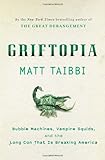 In his new book, Griftopia, Matt Taibbi tries to portray America as a thieve’s paradise, where foreign and domestic moneyed interests fleece the rest of us in the open and we are powerless to resist. Taibbi covers politics and, more recently, the financial crisis for Rolling Stone, and Griftopia is primarily a compilation of his recent feature stories. It’s an entertaining but ultimately frustrating and unsatisfying read, long on adjectives and invective but sorely lacking depth of analysis or reporting. Ultimately, Taibbi undermines himself: his assertions of fact, even regarding core points, often are colored past reality and occasionally are simply, provably wrong, discrediting the wild-eyed conclusions he reaches based on them.
In his new book, Griftopia, Matt Taibbi tries to portray America as a thieve’s paradise, where foreign and domestic moneyed interests fleece the rest of us in the open and we are powerless to resist. Taibbi covers politics and, more recently, the financial crisis for Rolling Stone, and Griftopia is primarily a compilation of his recent feature stories. It’s an entertaining but ultimately frustrating and unsatisfying read, long on adjectives and invective but sorely lacking depth of analysis or reporting. Ultimately, Taibbi undermines himself: his assertions of fact, even regarding core points, often are colored past reality and occasionally are simply, provably wrong, discrediting the wild-eyed conclusions he reaches based on them.

 Prior to the financial crisis, some of Taibbi’s best-known work, collected in previous books, involved politics and campaigns. This work, in tone as much as subject matter, implicitly invokes that of Hunter S. Thompson, who famously covered politics for Rolling Stone during the Nixon years, although Taibbi’s book on the 2004 campaign, Spanking the Donkey, pales in comparison to Fear and Loathing on the Campaign Trail ’72, probably the high point of Thompson’s career. Thompson’s stories often were filled with foul-mouthed, fractured and impossibly weird or vile allegations regarding its subjects, expanding or exploding reality to reflect some otherwise-inaccessible greater Truth. There doesn’t seem to be any greater Truth beyond the paranoia of Taibbi’s furious language, but in these Glenn Beck and Stephen Colbert days, what does it matter? Fear sells.
Prior to the financial crisis, some of Taibbi’s best-known work, collected in previous books, involved politics and campaigns. This work, in tone as much as subject matter, implicitly invokes that of Hunter S. Thompson, who famously covered politics for Rolling Stone during the Nixon years, although Taibbi’s book on the 2004 campaign, Spanking the Donkey, pales in comparison to Fear and Loathing on the Campaign Trail ’72, probably the high point of Thompson’s career. Thompson’s stories often were filled with foul-mouthed, fractured and impossibly weird or vile allegations regarding its subjects, expanding or exploding reality to reflect some otherwise-inaccessible greater Truth. There doesn’t seem to be any greater Truth beyond the paranoia of Taibbi’s furious language, but in these Glenn Beck and Stephen Colbert days, what does it matter? Fear sells.
The emotional core of the book lies in a rant that closes a chapter describing the creation and progression of the mortgage crisis:
At the tail end of all this frantic lying, cheating, and scamming on all sides, … the final result is that we all ended up picking up the tab, subsidizing all this crime and dishonesty and pessimism as a matter of national policy.
We paid for this instead of a generation of health insurance, or an alternative energy grid, or a brand-new system of roads and highways. With the $13-plus trillion we are estimated to ultimately spend on the bailouts, we could not only have bought and paid off every single subprime mortgage in the country (that would only have cost $1.4 trillion), we could have paid off every remaining mortgage of any kind in this country — and still have had enough money left over to buy a new house for every American who does not already have one.
But we didn’t do that, and we didn’t spend the money on anything else useful, either. Why? For a very good reason. Because we’re no good any more at building bridges and highways or coming up with brilliant innovations in energy or medicine. We’re shit now at finishing massive public works projects or launching brilliant fairy-tale public policy ventures like the moon landing.
What are we good at? Robbing what’s left. When it comes to that, we Americans have no peer.
Well, if he’s right, then America is truly Fucked. Time to hit the road, bub. Luckily for us, however, Taibbi is dead wrong about the $13 trillion figure, and, as a result, America may not be hopeless after all.
Sure, it’s been reported that the total potential cost of the bailouts is $12.8 trillion, true, but the crucial word there is “potential.” $12.8 trillion is the potential total cost if every dollar the government pledged or loaned were actually paid out and never paid back.
But that’s not what’s happening. Much of the money loaned already has been repaid, and on some of the constituent “bailouts,” the government actually may make a profit. And, likewise, much of the money used to guarantee assets will never be tapped. This is a good thing for America. And it’s also a distinction that a professional reporter who has been knee-deep in the financial crisis should have recognized before proclaiming the moral bankruptcy of the country. It would be a devastating passage if it weren’t fundamentally untrue.
Look, I agree with Taibbi, at least in spirit, on some issues he raises, but if you’re going to be caustic and depressing and a brutal buzzkill I think you have a responsibility to make sure your facts are correct, especially a fact that forms the crux of both the chapter it ends and of the central depressing accusations of the entire book. And because the subjects Taibbi covers – securitized mortgage instruments, the commodity markets, etc., — are hyper-complex, I had trouble putting any faith in Taibbi’s understanding and descriptions of the details once I noticed that he whiffed on a few of those that I already understood.
Taibbi carries his populist flag throughout the book, and in the final chapter acknowledges proudly that class warfare is one of his goals while asserting that those who panned his Goldman Sachs article were with Them in this great battle, and not Us, claiming that the criticisms of his piece amounted to nothing more than a defense of “class privilege.” Like so much else in Griftopia, this is fun and entertaining, sure, but lazy. Had Taibbi’s article been about “class privilege” and seriously wrestled with the structure and institutions of the American economy that led to the problems he identified, it explicitly or implicitly would have suggested solutions. Instead, Taibbi aims for the fattened ducks operating the levers of power rather than the levers themselves: he seems quite proud, for example, of publicly calling Goldman chief Lloyd Blankfein a “motherfucker.”
Griftopia portrays America as a ghetto being looted by evil drug lords, but a simpler explanation of the financial crisis, to me at least, seems to be the economics of laziness and arrogance. Laziness in entering a trade that is working (here, seemingly safe mortgage bonds) not because it makes sense but because it is easy and arrogance in assuming that you will know precisely when to get out. And the evidence from the last bubble (and the tech bubble before that) seems to be that as good as these Wall Street folks may have been at riding a massive wave to shore, few knew how to pull off before the wave broke.
 On Griftopia’s back cover, Taibbi’s publishers praise him via pull quote as supplanting Michael Lewis as the “King Writer of Wall Street.” Not so fast. Lewis’s most recent book, The Big Short, walks the reader through the last few years of economic crisis with a level head and enough detail to allow a reader to understand how decisions that almost brought down the world could have seemed so common sense at the time to those who made them. Lewis’s book handles the complexity of the financial world with both grace and precision. Taibbi’s approach is closer to a drunken swagger: seemingly smooth, but not necessarily precise.
On Griftopia’s back cover, Taibbi’s publishers praise him via pull quote as supplanting Michael Lewis as the “King Writer of Wall Street.” Not so fast. Lewis’s most recent book, The Big Short, walks the reader through the last few years of economic crisis with a level head and enough detail to allow a reader to understand how decisions that almost brought down the world could have seemed so common sense at the time to those who made them. Lewis’s book handles the complexity of the financial world with both grace and precision. Taibbi’s approach is closer to a drunken swagger: seemingly smooth, but not necessarily precise.
To be fair, Griftopia and The Big Short serve different audiences. Taibbi’s book will be of greatest utility to those who know exactly what they think but aren’t quite sure why. Lewis’s book well serves everyone else.
Bonus Link: Stockholm Syndrome: Two Books on High Finance









